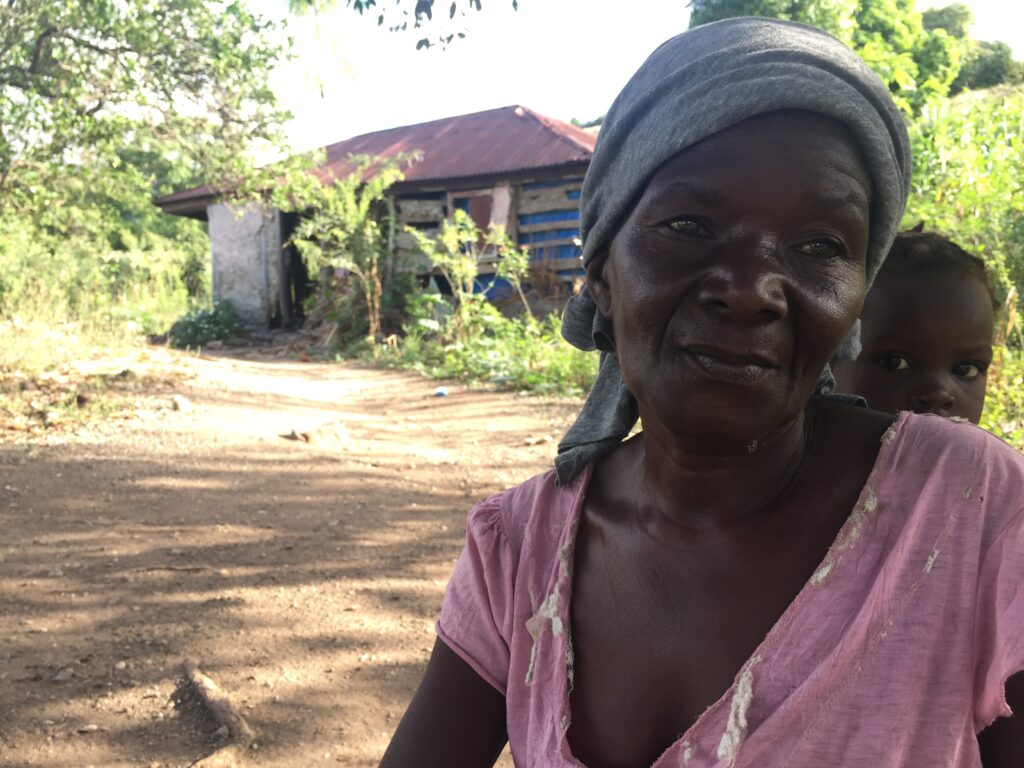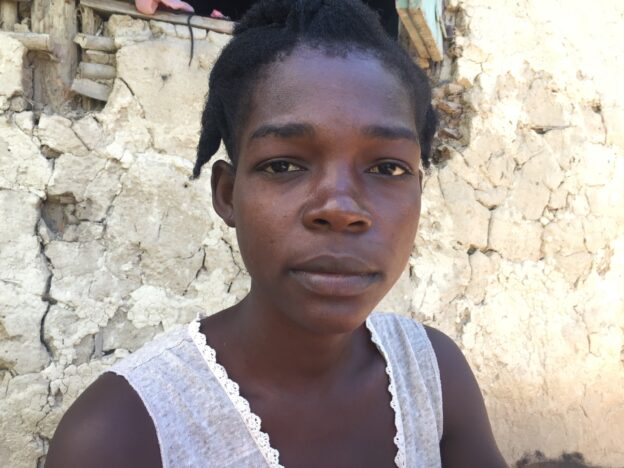Loralda Vil lives near Route 5, the road that leads north out of Gwomòn towards Pòdpe. She, her partner, and her three children share a small, deteriorating house that is owned by someone who moved to Pòtoprens. “They’ve been letting us sleep here, but now I hear they’re trying to sell the house, and I don’t know what we’ll do. We don’t have the money to buy it.”
She’s also raising a younger sister. The girl left their mother’s home because the mother is a heavy drinker and couldn’t take care of her. She moved in with a stranger, becoming one of many Haitian children who live as domestic servants, but the woman eventually kicked her out because she made a costly error making change for someone while trying to help in the woman’s business. Loralda likes having her sister around. “She’s helpful, but I don’t like it when she does stuff I tell her not to do.”
Loralda and her partner struggle to send the girl to school, though Loralda’s older brother helps some. Their two older children are five and three, and should be in school, too, but Haiti’s political conflict has prevented the school Loralda registered them for from opening this year. Once school starts — probably in January — Loralda will need to figure out how to pay the fees. She doesn’t see where the money’s to come from yet.
With her third child an infant still nursing, Loralda isn’t earning any income herself, and the couple has no land to farm. The depend completely on whatever small jobs her partner can find. He doesn’t have a trade, but people sometimes hire him to move a pile of sand or some cement at a construction site. It’s hard work that’s poorly paid, and it’s hard to come by, but it is all the couple has.
She has simple goals for herself as a CLM member. “I want the program to help me send my kids to school, to buy them a pair of sandals if they need one. I want it to help me get them to the doctor’s if they’re sick.” She chose goats as her first enterprise. She wants eventually to become a trader, but she thinks that, as things stand for her right now, her children would eat up any little business she started. “When the goats start to have kids, I’ll call my case manager and plan to sell one so I ca start a business with the money.”

Meloya Paul lives south of Loralda’s neighborhood, off the same road. She and her partner live in a house that belongs to him. It’s a short hike east of the main road. The house looks as though it was once solid enough, but the earthquake of 2018 brought down sections of its walls. The roof above it held, but much of it is now open to the elements. They haven’t had the money to make repairs.
She and her partner first moved in together in 1990. At the time, she already had two children, and together they had two more. But all four children died. When the last one passed away, Meloya left the home. “The shock of it made me what I am. If I had children, I wouldn’t look like this.” She spent 25 years wandering around the streets of Gwomòn as a beggar. “It’s better to beg than to steal. Stealing leaves a stain on your whole family.”
After she left him, her partner had four children with another woman, but when that woman grew ill, he was at a loss. He asked Meloya to move back in to help him take care of his children’s mother, and she agreed. When the woman died, she decided to stay to take care of the four kids. “They’re my children now.”
The couple struggles to feed themselves and the kids. They depend on such unreliable, poorly-paid day labor as her partner can find. She asked the program to give her goats and a sheep, and she explained by talking accurately and in some detail of the cost of raising a pig. “You can’t raise a pig without means.”
When I told her that I could see she has a head for figures, that she “knows money” well, she smiled, but she denied it. “I don’t know money. I’m egare.”
“Egare” means dumb. And when her case manager, Pétion, heard her say it, he jumped in.
“Have you told Steven what you did with the water?”
Meloya smiled.
After the launch ceremony for the group CLM members Meloya is part of, there was an extra sack of bags of water. The sacks go for 75 gourds, or about 80 cents, and hold 50 little bags. Pétion explained that he wanted to see what Meloya was capable of, and he was pleased with the results. In less than a month, she turned that 75-gourd gift into a 300-gourd business. She no longer sells water, but buys small amounts of hot peppers and limes, and sells them in even smaller amounts. She has been making 60% profits every time she turns the capital around.
